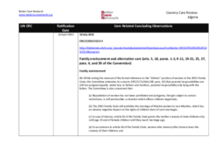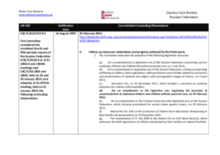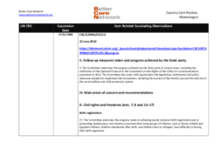Displaying 201 - 210 of 462
This report is the product of a two-year investigation by Disability Rights International (DRI) into institutions and orphanages across Kenya. The report describes the "egregious human rights violations" perpetrated against children with disabilities in Kenya, particularly those who are confined to institutions and "orphanages."
This country care review includes the care related Concluding Observations adopted by the Committee on the Rights of the Child and the Committee on the Rights of Persons with Disabilities.
This country care review includes the care-related Concluding Observations adopted by the Committee on the Rights of the Child and the Committee on the Rights of Persons with Disabilities.
The purpose of this paper is to critically reflect on the conditions and context of deinstitutionalization and the process of transformation of the institutions for children with behavioural problems from several key aspects: current offer of treatment programs and interventions in institutions and communities, competences of professionals in transformation process, research related to needs and risks of children and education of future professionals.
This study tests the associations of risk and protective factors on mental health outcome variables of youth in foster care with disabilities.
This study explores the impact of a participatory training programme for caregivers delivered through a local support group, with a focus on understanding caregiver wellbeing.
The objective of this evaluation is to assess the performance of the “Deinstitutionalization of Orphans and Vulnerable Children Project in Uganda” (DOVCU) with regards to the creation of sustainable changes in the lives of two beneficiary groups, namely 43,000 vulnerable children living in targeted households and 2,000 children at risk as a result of an integrated package of support.
This study draws on a bioecological systems perspective to propose the parameters for a broader unit of analysis of inclusion for young children with disabilities in research within low- and middle-income countries (LMICs) contexts.
This country care review includes the care related Concluding Observations adopted by the Committee on the Rights of the Child and the Committee on the Rights of Persons with Disabilities.
This country care review includes the care-related Concluding Observations adopted by the Committee on the Rights of Persons with Disabilities.








